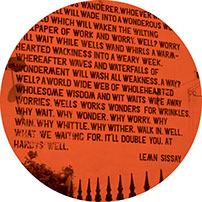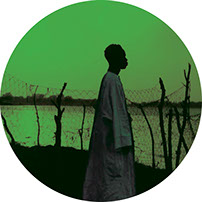N O T E S F R O M T H E S O U T H
 Rays of Sunshine
Rays of Sunshine
Stimela was one of South Africa’s supergroups, achieving fame and critical acclaim both home and abroad. But that doesn’t mean everyone knows who they are. Peter Machen spoke to Ray Phiri, the group’s former frontman and lyricist.
I’ll never forget Ray Phiri. More specifically, I’ll never forget his presence at the first Awesome Africa concert at the base of the Shongweni Dam. It was a performance that was bathed in magic. With the whole of Stimela on stage, Phiri was not so much a man as a conduit for the swirling ball of energy and history that flowed around him.
At that triumphant show, he played an aching set with Afrikaans accordion player Nico Carstens, aka the king of boere-orkes. And neither will I forget the tears in Carstens’s eyes, nor the light spring rain that came down and drove the crowd into a frenzy of elemental delight. If music is proof of the existence of the divine, it is also proof of the power of humanity to heal itself. And when Phiri sings, it feels as if the universe itself is silently responding, and whoever is listening is changed in some small way.
It’s four years later, and I’m privileged to be sitting at Café 1999 with Phiri, discussing the future of South African culture, a future which is linked inextricably, no matter how much we might try to deny it, with the past. There is the vast, troubled history of South Africa, and all the terrible and brilliant things that emerged from that. And then there are the small, intensely personal strokes which are wrapped up in that broader canvas. Phiri and I, with 20 years between us, talk about what has happened here and what is going to happen.
He is an eloquent supporter of President Thabo Mbeki, and I like Phiri too much to engage in that discussion when there are more cogent things to discuss – things that haven’t already been thrashed out unsuccessfully a million times. These include things like his father – a topic to which Phiri constantly returns, the father being a metaphor for both our past and our relationship to the future.
Phiri never looked his father in the eye – to do so would be disrespectful. But maybe there comes a time when we have to disrespect our fathers and engage with them as people, not elders. For Phiri and his dad, that moment never came. Phiri regrets nothing, but he cannot forget the fact that his father never saw him perform as a professional musician, and that they never saw eye to eye. When his turn came, like most African men in the ’70s and ’80s, Phiri also experienced extended periods of absence from his family, touring as a musician and a cultural activist. The personal gets sacrificed for many, uncountable reasons.
It is only now that he lives at home, with his mother and three of his eight children (from two wives and four girlfriends). He cooks every night, using it as meditation and a form of spiritual download. And, like many fathers, he doesn’t get on with his 21-year-old son. But these personal stories are always couched in the metaphors and structures of history and politics. Phiri’s son is from a generation obsessed with Levis, Diesel, swish parties and swisher drugs. I ask Phiri how long he thinks it will take South Africa to realise the falseness of the promise of consumerism. 30 years, he reckons.
Phiri, coincidentally, has spent the last 30 years as a musician and an activist. And during that time, he has no doubt followed some of his own illusions and false promises. But now at the age of 51 (and still a rubber-legged joller) he finds himself seeking out the simple things in life and finding out how difficult they are to achieve. As well as cooking for his family, he is also helping to establish the cultural menu of South Africa, to discover and explore mechanisms that will help us find ways to tell each other our own stories, to sing each other our songs.
Phiri has recently been spending time in Durban trying to help develop a programme for The Playhouse. He sits on the Mpumalanga wing of the Provincial Arts Council and has sat with various working groups of the National Arts Council and other cultural bodies. He takes great joy in finally seeing things unfold, although with a full awareness of how much more needs to be done, and how few resources are currently available. After we’ve finished talking (a marathon discussion as it turns out), I quickly snap some photographs of Phiri. As the camera flashes, the table of four next to us suddenly takes an interest. Not because they recognise Phiri, but because they presume he’s famous. And he is. But fame in South Africa is a strange and difficult creature. I tell them that Phiri used to be the lead singer of Stimela.
This means nothing to them. I then tell them about Awesome Africa, whose latest iteration is coming up soon. “But we haven’t seen it advertised,” says the jovial man who assumes the position of head of the table. Then you haven’t been looking, I think. Nonetheless, I try to extract a promise from them to attend. But to no avail. They have other plans.
“This is the thing,” says Phiri, as we get into my car, “They don’t know because they don’t want to know.” These people at the other table, amicable as they were (the jovial man even asked Phiri for his autograph, despite the fact that he didn’t know who he was) represent one of the challenges which faces Phiri, me, and all the thousands of people who are trying to deliver the culture of a country to its own people. We live in a land where nobody wants to know.
Of course, anyone can find out. In this city specifically, where nothing ever happens, there is a treasure trove of culture waiting around every unexplored corner. You can start by spending your weekend at Awesome Africa. And you can continue on a daily basis, piecing together fragments until you get a sense of the ever-expanding cultural jigsaw that is life in South Africa. Some of those fragments include the Stimela and Ray Phiri albums. And, of course, there are hundreds of other musical artifacts that might give you a deep, swelling pride in where you come from, without any need for advertising slogans. Seek and ye shall find yourself.
I will never forget Ray Phiri.
© 2017 Peter Machen. All rights reserved About Contact Peter Machen Web design: The Communication Factory



